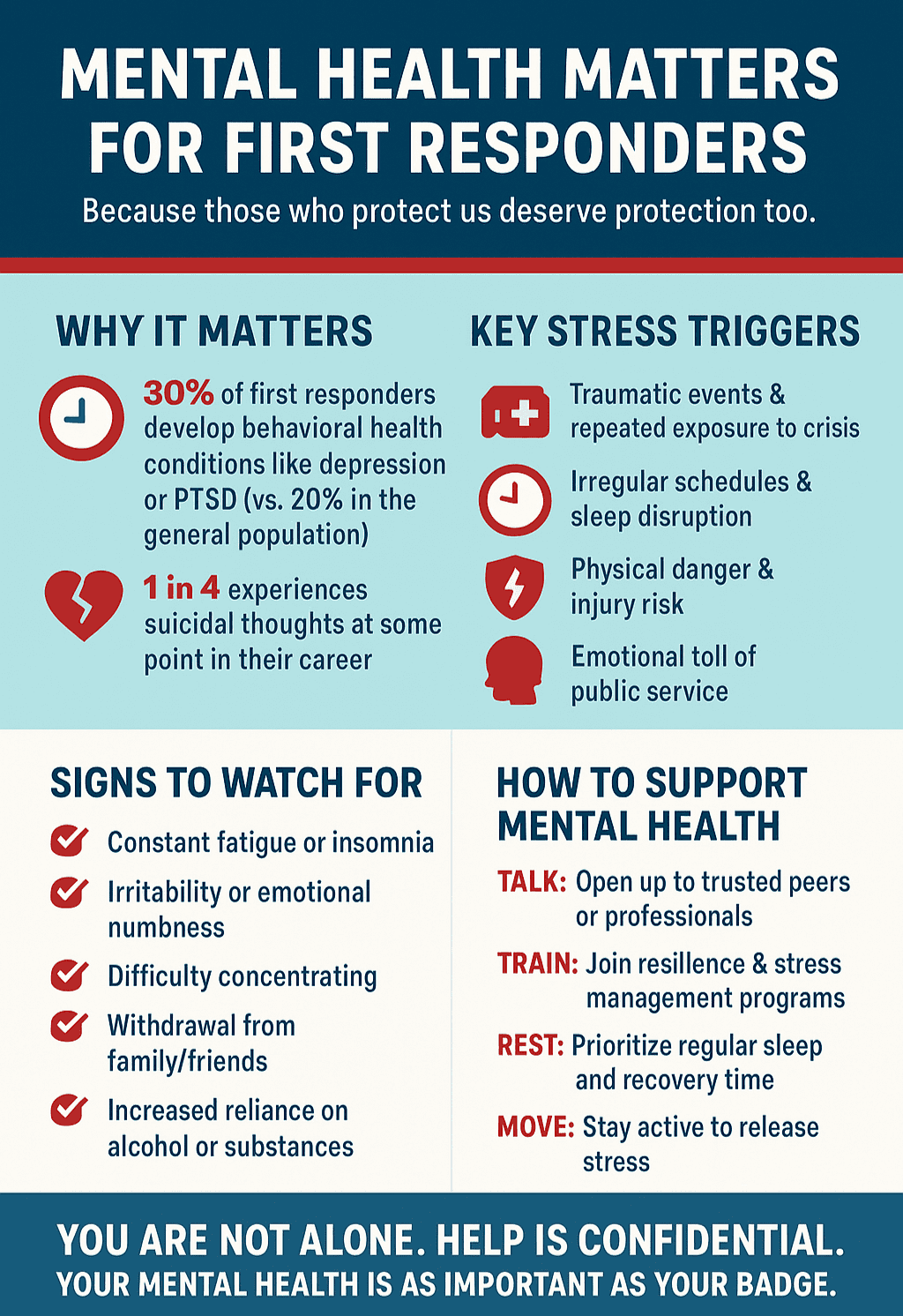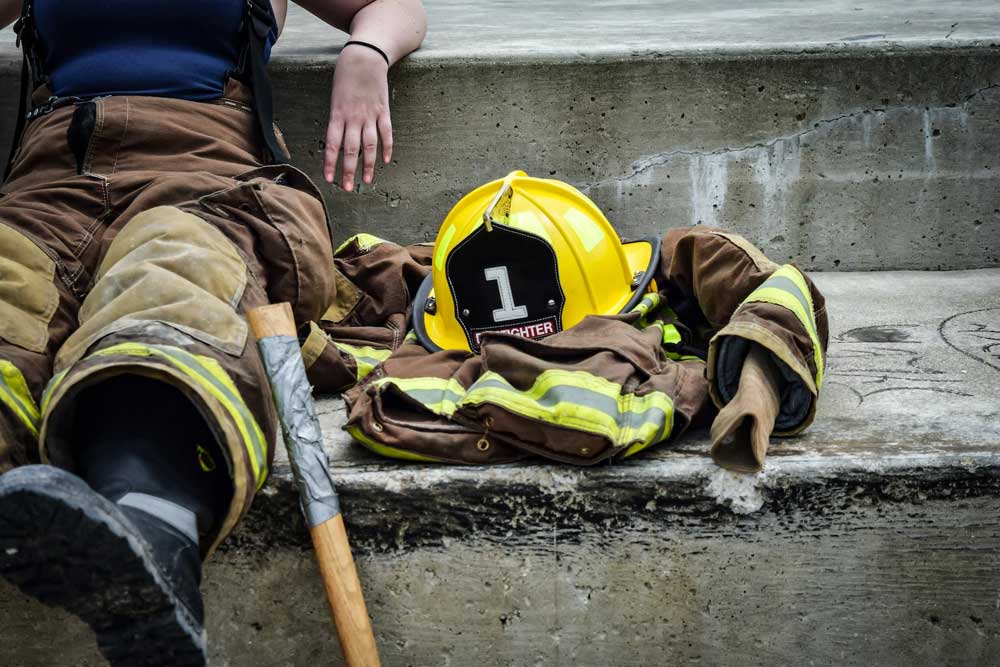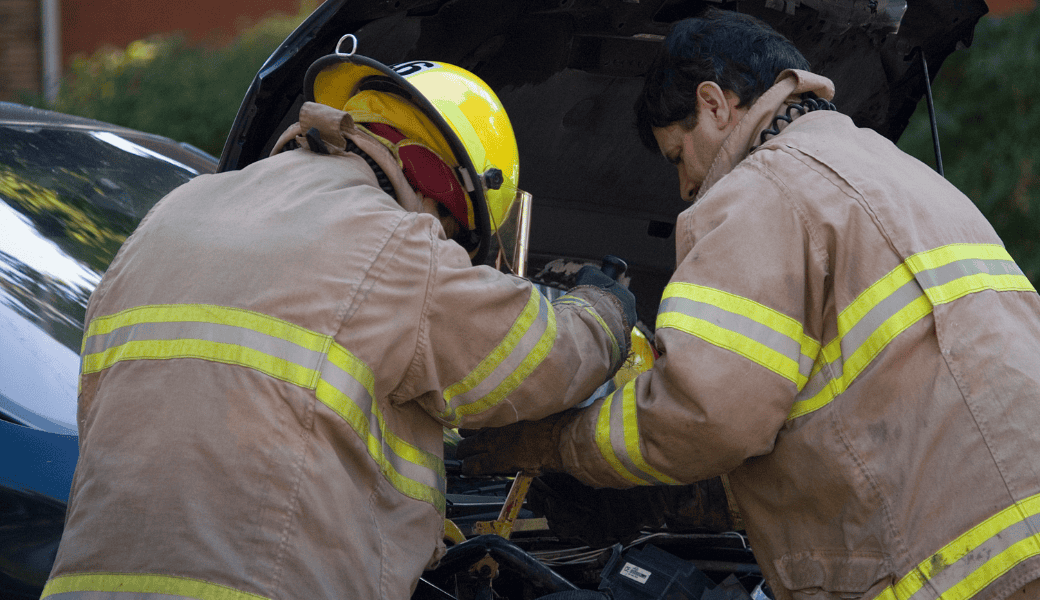First responders are almost like the ultimate saviours of a city, a society. They are the ones who rescue the masses from fire, dangerous accidents, floods, or any other catastrophe. The nature of their job makes them extremely important but also very vulnerable to massive injuries, trauma, and many other large-scale hazards.
First responders’ mental health is consistently exposed to violence, fire, tragic accidents, and sometimes deaths, making them vulnerable mentally, too. Many first responders face PTSD (Post-Traumatic Stress Disorder), psychosomatic injuries, and panic disorders. While the nature of their jobs cannot be changed, offering accessible and effective enough care, especially related to mental well-being, is crucial.
Firefighters, paramedics, police officers, Emergency Medical Technicians (EMTs), and disaster relief workers are First responders. They consistently have to appear ready and professional for their duty. This also creates quite a lot of pressure. In addition to that, exposure to the brutality of life affects first responders’ mental health and sense of calm.
How First Responders Face Mental Strain
Signs of mental health struggles are noticeable yet can be subtle and build up over time.
• Increased irritability or anger:
Feeling impulses of angry responses to every inconvenience that occurs or a consistent feeling of irritability are signs of worsening mental well-being. This can strain personal relationships and create tension within professional teams.
• Emotional detachment from loved ones
Feeling kind of ‘flat’ instead of being able to feel spikes of positive feelings like joy and connection. Feeling a sense of detachment from family and friends. Feeling a kind of emptiness.
• Hypervigilance or constantly feeling “on edge”
Not being able to relax even at night. A body and mind that remains on ‘alert mode’ always
• Trouble sleeping or nightmares
Not being able to induce sleep naturally and tossing and turning in bed till morning can be frustrating. Bad quality of sleep or a lack of sleep can itself deteriorate mental well-being, too.
Avoidance behaviors (refusing to talk about work, withdrawing from family or friends)
Not getting involved in the activities you once used to find interesting is one of the signs, too. Avoiding meet-ups with family or friends shows a withdrawal from social activities.

• Possible Risks for First Responders
First Responders can face a myriad of troubles, which can trigger multiple mental health issues. With the demanding job they have, day in and day out, they witness scenes of trauma, tragedy, and human suffering that most of us find uncomfortable to think about. The struggles and suffering of first responders often go silent. Recognising their mental struggles starts with identifying the signs shown above.
Moreover, asking for help or seeking therapy is slowly being considered as more of a strength and less of a weakness. Owing to that, first responders also have been getting help related to therapy. First responders are the vital threads in our societal safety net, and they also can fall prey to the mental health issues mentioned below:
• Chronic Stress
First responders usually have long working hours, requiring alertness and strength for a long time. Those who have shifts, especially night shifts, also have to handle odd, lengthy, and demanding working hours. This can trigger severe stress and fatigue. With that, they might develop a weakened immune system and a risk for cardiovascular problems.
• Burnout
Burnout is, unfortunately, very common in many professions today. However, first responders are most likely to get it within a short time. The frequent calls of emergency, having to respond within minutes, and having someone’s life depend on you is a lot to handle. And having to do this on a daily basis can quickly drain anyone of the energy and mental capacity to handle.
Prolonged and excessive stress, especially at the workplace, causes burnout, leading to emotional, physical, and mental exhaustion.
• Post-Traumatic Stress Disorder (PTSD)
This is the most common disorder amongst first responders. Considering they frequently witness traumatic events and often get themselves into it to save others, unfortunately, they become much more vulnerable to Post-Traumatic Stress Disorder.
First responders are at the highest risk of PTSD. First responders with PTSD in first responders Canada can get Intrusive Memories, distressing memories, flashbacks, or nightmares related to the traumatic event. This is one of the main symptoms. Persistent negative thoughts and a consistent bad mood are also signs of post-traumatic stress. To find a solution to the same, look for a first responder therapist near me.

• Depression and Anxiety
Other mood disorders like depression and various anxiety disorders can also take place in the headspace of first responders. Depression and anxiety can occur when the serotonin and other hormones responsible for mood witness an imbalance. Witnessing injuries, deaths, and other distressing situations as part of a job makes one even more at risk for mood disorders.
• Substance Use Disorders
First responders often, because of a lack of a support system, begin to either smoke or consume alcohol as a way of coping. This is where the misuse of substances starts. If not stopped and guided properly, Substance Use Disorders can lead one to take drugs, and it’s quite challenging to come out of escalated drug misuse. Such an addiction can destroy their work life as well as their family, causing massive personal damage.
• Sleep Disturbances and Insomnia
Irregular hours, shift work, and racing thoughts often leave first responders running on minimal rest. Lack of restorative sleep can impair memory, judgment, and emotional regulation, making every day feel harder than the last.
• Suicidal Ideation
Suicidal thinking is the extreme and the most disheartening stage of any mental struggle. It is a reminder that emotional wounds, when ignored, can become fatal. Not paying attention when needed and continuing with issues like burnout can lead to such an unfortunate happenstance.
Our first responders dedicate their lives to protecting our communities. First and foremost, what they would need is therapy as part of their mental health care. However, what is first responder therapy is a question that would require more pondering. It is our collective responsibility to ensure that they have the support and resources they need to protect their own mental well-being.
By proactively developing a culture of understanding, empathy, and accessible care, we can help these heroes navigate the invisible wounds of their profession and continue to serve our communities with strength and resilience, here in Ontario, and across the globe.
At Town Psychological Services, we understand the unique challenges faced by first responders and are committed to maintaining the highest standards of confidentiality. If your work has led to occupational or operational stress injuries, we encourage you to reach out for support.

